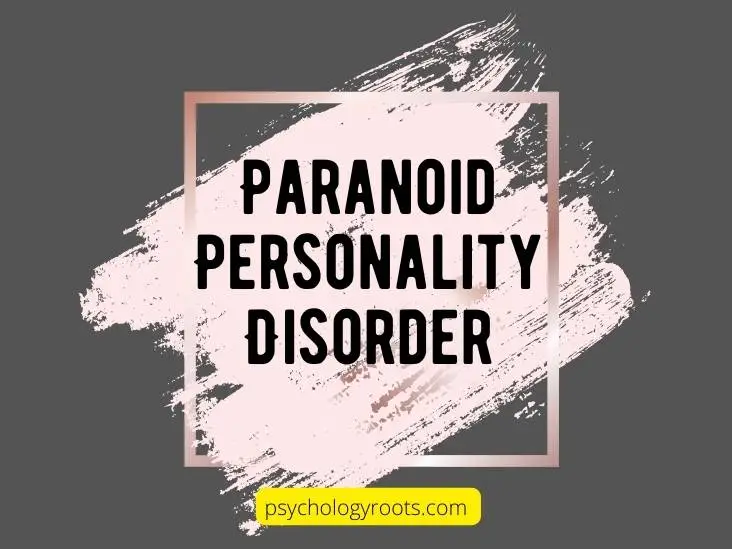Table of Contents
Paranoid Personality Disorder
Here in this post, we are discussing “Paranoid Personality Disorder”. You can read more about psychology-related material on our website. Keep visiting Psychology Roots.
Distrust, mistrust, animosity, and envy toward others are hallmarks of paranoid personality disorder (PPD), as are other negative thought and behaviour patterns. PPD sufferers often suspect others of bad intent and strive to hurt them. Psychotic symptoms, such as delusions and hallucinations, may be brought on by PPD.

Paranoid Personality Disorder
Paranoid Personality Disorder
The American Psychiatric Association’s (APA) criteria for diagnosing PPD may be found in the Diagnostic and Statistical Manual of Mental Disorders, 5th Edition (DSM-5). The following are some of the diagnostic criteria that might be used:
- Suspicious of others without proof that they are being used, harmed, or deceived
- Worried that what they say may be used against them, they have trouble trusting their friends and are thus less inclined to confide in them.
- Having trouble trusting people, being quick to take offence, and unable to let go of grudges or resentment.
- Suspecting partners and spouses of infidelity.
May react angrily or counterattack if they feel their reputation has been attacked
Symptoms
People with PPD may struggle in everyday life because to their heightened scepticism of others’ motives and actions.
Additional signs and symptoms of PPD include:
- Hard-headed and too judgmental of others
- They have a hard time taking constructive criticism
- Cooperation issues; struggles to work well with others
- Potentially placing blame on others for their own failings
- could engage in excessive litigation and frequent legal conflicts
- Grandiose fantasies are possible.
- centred on questions of hierarchy and control
- Potential for stress-induced psychotic episodes
Causes
PPD often manifests itself in younger people or teenagers. Some studies have shown a link between PPD and a family history of mental illness, including schizophrenia and delusional disorder. Other studies have shown that childhood trauma is a reliable predictor of PPD. Neglect of any kind, including emotional, physical, supervision, and physical abuse, throughout childhood increases the likelihood of developing PPD.
The likelihood that an individual may suffer from PPD increases among those who have PTSD. PPD is often associated with brain damage. PPD may be diagnosed in up to 26 percent of patients who have had brain injury.
Treatment
Treatments for PPD differ based on symptoms and other illnesses the individual may have. Treatment for any kind of personality disorder usually requires both medication and counselling.
Medication
No FDA-approved drugs exist for the treatment of PPD, and there are currently no pharmaceuticals on the market that can treat a personality disorder. Although medicine is often used to lessen the severity or frequency of symptoms.
Medications to treat PPD may include antipsychotics, antidepressants, and mood stabilisers.
Therapy
There are three potential forms of treatment for PPD, according to the literature.
- Effective treatment for PPD includes cognitive behavioural therapy (CBT). The focus of cognitive behavioural therapy (CBT) is on examining the ways in which one’s ideas affect their attitudes and actions.
- Dialectical behaviour therapy (DBT) is another helpful treatment for PPD because it validates the client, promotes emotional control, and teaches coping mechanisms.
- Treatments like cognitive behavioural therapy (CBT) and interpersonal psychotherapy are combined in mentalization-based treatment (MBT). As a result, one’s capacity for mentalization improves, which is the ability to analyse one’s own motivations, attitudes, and actions.
Summary
Distrust, mistrust and animosity toward others are hallmarks of paranoid personality disorder (PPD). PPD sufferers often suspect others of bad intent and strive to hurt them. Psychotic symptoms, such as delusions and hallucinations, may be brought on by PPD. Neglect of any kind, including emotional, physical, supervision, and physical abuse, throughout childhood increases the likelihood of developing PPD. PPD may be diagnosed in up to 26 percent of patients who have had brain injury. No FDA-approved drugs exist for the treatment of PPD, and there are currently no pharmaceuticals on the market.
Help Us Improve This Article
Have you discovered an inaccuracy? We put out great effort to give accurate and scientifically trustworthy information to our readers. Please notify us if you discover any typographical or grammatical errors.
Make a comment. We acknowledge and appreciate your efforts.
If you have any scale or any material related to psychology kindly share it with us at psychologyroots@gmail.com. We help others on behalf of you.